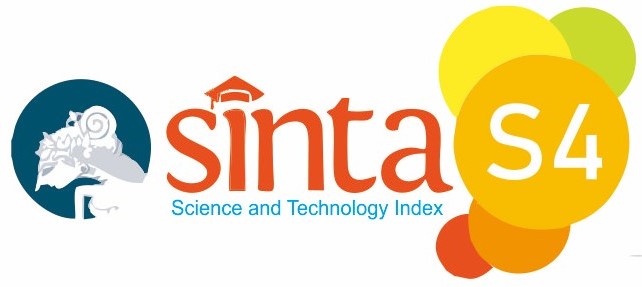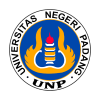DEVELOPMENT OF E-MODULES IN THE SUBJECT OF MANUFACTURING DRAWING TECHNIQUES AT SMKS DHUAFA PADANG
Abstract
The learning media used previously for the Manufacturing Drawing Technique subject in class XI of Machining Engineering has not been optimal in achieving learning objectives. Therefore, this research aims to develop e-modules as learning media at SMKS Dhuafa Padang. The research used an R&D development model in education based on the IDI model, which was carried out in the odd semester of FY 2023/2024. The IDI model includes three stages: determination, development, and assessment. Data were collected through a validation sheet in the form of a questionnaire and analyzed with quantitative descriptive statistics. The results showed that this e-module was feasible to use as an independent learning media with a final validity value of 0.83 from material experts and 0.90 from media experts, which met the valid criteria. The e-module practicality test showed very practical results, with an average percentage value of 93.6% from the teacher's assessment. The use of this e-module is expected to provide several significant advantages for the learning process. First, this e-module allows more flexible access to learning for students, allowing them to learn anytime and anywhere at their convenience. Secondly, interactive and engaging e-modules are expected to increase students' motivation and interest in learning. Thus, this e-module not only helps students understand the subject matter better but also supports the development of self-learning skills essential for long-term academic success.
References
Ahmad, M., Kuldasheva, Z., Nasriddinov, F., Balbaa, M. E., & Fahlevi, M. (2023). Is achieving environmental sustainability dependent on information communication technology and globalization? Evidence from selected OECD countries. Environmental Technology and Innovation, 31, 103178. https://doi.org/10.1016/j.eti.2023.103178
Aini, A. Q., Leksono, S. M., & Kurniasih, S. (2024). Validity of research-based e-module on conservation theme to environmental literacy attitude of junior high school students. BIO-INOVED : Jurnal Biologi-Inovasi Pendidikan, 6(1), 89. https://doi.org/10.20527/bino.v6i1.17664
Aisyah, S., Saputra, D., Khairi, A. I., & Asa, F. O. (2023). Learning Media Validity Based On Interactive Module Digital On Batik Materials In Fine Arts Education Program (Issue Icla). Atlantis Press SARL. https://doi.org/10.2991/978-2-38476-124-1_21
Alordiah, C. O., & Ossai, J. N. (2023). Enhancing Questionnaire Design: Theoretical Perspectives on Capturing Attitudes and Beliefs in Social Studies Research. International Journal of Innovative Science and Research Technology, 8(10). https://doi.org/: https://orcid.org/0000-0002-2917-9302
Alvarez, J. O. D., & Baraquia, L. G. (2023). Development and Validation Of e-Learning Modules in Science 8 For Blended Modality Through Genyo e-Learning. International Journal of Academic Multidisciplinary Research, 7(4), 198–213. https://doi.org/10.2139/ssrn.4832717
Anjarwati, S., Darmayanti, R., & Khoirudin, M. (2023). Development of “Material Gaya” Teaching Materials Based on Creative Science Videos (CSV) for Class VIII Junior High School Students. Jurnal Edukasi Matematika Dan Sains), 11(1), 163–172. https://doi.org/10.25273/jems.v11i1.14347
Arif, V. R., Afnan, M., Usmiyatun, U., & Lestari, C. Y. (2023). Development of Social Studies Animation Video (S2AV) Teaching Materials on the Material “Plurality of Indonesian Society” for Junior High School Students. Assyfa Learning Journal, 1(1), 01–11. https://doi.org/10.61650/alj.v1i1.2
Boari, Y., Megavitry, R., Pattiasina, P. J., Ramdani, H. T., & Munandar, H. (2023). The Analytical of Effectiveness of Mobile Learning Media Usage in Train Student’s Critical Thinking Skills. Mudir: Jurnal Manajemen Pendidikan, 5(1), 172–177. https://doi.org/https://doi.org/10.55352/mudir
Cynthia, C., Arafah, K., & Palloan, P. (2023). Development of Interactive Physics E-Module to Improve Critical Thinking Skills. Jurnal Penelitian Pendidikan IPA, 9(5), 3943–3952. https://doi.org/10.29303/jppipa.v9i5.2302
Damayanti, F., M Sianturi, N., Damayanto, A., Bangkara, B. M. A. S. A., & Hajja Ristianti, D. (2023). The Excellence of Lecturer HR in Increasing Competition In Research-Based Higher Education Services. Tafkir: Interdisciplinary Journal of Islamic Education, 4(1), 37–57. https://doi.org/10.31538/tijie.v4i1.292
Daryanes, F., Darmadi, D., Fikri, K., Sayuti, I., Rusandi, M. A., & Situmorang, D. D. B. (2023). The development of articulate storyline interactive learning media based on case methods to train student’s problem-solving ability. Heliyon, 9(4), e15082. https://doi.org/10.1016/j.heliyon.2023.e15082
Daud, A., Linda, R., Harfal, Z., Nabila, O., Suryani, A., & Tahirah, Z. (2024). Multimodal Text-Powered Interactive E-Module for Enhancing English Structure Learning. 6(1), 1–20. https://doi.org/https://doi.org/10.31849/reila.v6i1.15988
E. Sankar, D. A. E. W. B. (2023). Studying The Impact Of E-Modules And Online Self-Directed Learning Of Chemistry At The Higher Secondary Level. Физиология Человека, 5(2), 1795–1816. https://doi.org/10.31857/s013116462104007x
Fadil, M. A., Mukhidin, M., & Elvyanti, S. (2023). Development of E-module Internet of Things (IoT) Antares by PT. Telkom Indonesia Based on Science, Technology, Engineering, and Mathematics (STEM) for Vocational High School Students. Journal of Digital Learning and Education, 3(3), 233–242. https://doi.org/10.52562/jdle.v3i3.815
Giovanardi, M., Konstantinou, T., Pollo, R., & Klein, T. (2023). Internet of Things for building façade traceability: A theoretical framework to enable circular economy through life-cycle information flows. Journal of Cleaner Production, 382(August 2022), 135261. https://doi.org/10.1016/j.jclepro.2022.135261
Handog, S., & Aliazas, J. V. (2024). Adaptive E-Learning Module In Teaching Physical Science For Improved Student Engagement And Critical Thinking Skills. Ijsart, 10(3). https://doi.org/10.5281/zenodo.10947524
Hanif, M. Al, & Santosa, B. (2023). Development of E-Modules Based on Project Learning in Vocational High Schools. Journal of Vocational Education …, 6(2), 264–276. https://doi.org/https://doi.org/10.12928/joves.v6i2.9304 Development
Jiang, Y., Hossain, M. R., Khan, Z., Chen, J., & Badeeb, R. A. (2023). Revisiting Research and Development Expenditures and Trade Adjusted Emissions: Green Innovation and Renewable Energy R&D Role for Developed Countries. In Journal of the Knowledge Economy (Issue 0123456789). Springer US. https://doi.org/10.1007/s13132-023-01220-0
Kittur, J. (2023). Conducting Quantitative Research Study: A Step-by-Step Process. Journal of Engineering Education Transformations, 36(4), 100–112. https://doi.org/10.16920/jeet/2023/v36i4/23120
Kooli, C. (2023). Chatbots in Education and Research : A Critical Examination of Ethical Implications and Solutions. https://doi.org/; https://doi.org/10.3390/su15075614
Legi, H., Damanik, D., & Giban, Y. (2023). Transforming Education Through Technological Innovation In The Face Of The Era Of Society 5.0. Educenter : Jurnal Ilmiah Pendidikan, 2(2), 102–108. https://doi.org/10.55904/educenter.v2i2.822
Leschok, M., Cheibas, I., Piccioni, V., Seshadri, B., Schlüter, A., Gramazio, F., Kohler, M., & Dillenburger, B. (2023). 3D printing facades: Design, fabrication, and assessment methods. Automation in Construction, 152(December 2022), 104918. https://doi.org/10.1016/j.autcon.2023.104918
Lim, W. M., & Kumar, S. (2024). Guidelines for interpreting the results of bibliometric analysis: A sensemaking approach. Global Business and Organizational Excellence, 43(2), 17–26. https://doi.org/10.1002/joe.22229
Ly, P., Bani, M., Hariana, V., & Meok, P. (2024). Development of E-Modules for Elementary Students. Pegem Journal of Education and Instruction, 14(3), 300–310. https://doi.org/10.47750/pegegog.14.03.28
Muh Hilmi Pauzi, Musleh, Evilia Rochmi, Mahrun, & Riadatus Solihin. (2023). Non-phisical Tourism Infrastructure; How Specific Allocation Fund (DAK) Contributes to Local Human Resources? JMET: Journal of Management Entrepreneurship and Tourism, 1(1), 39–51. https://doi.org/10.61277/jmet.v1i1.15
Nafandri Utama, M. V., Cahyani, I., & Kurniawan, K. (2023). The Multimodal Indonesian Flipbook E-Module for Vocational High School Students: Spotlighting the Usefulness. AL-ISHLAH: Jurnal Pendidikan, 15(4), 4317–4327. https://doi.org/10.35445/alishlah.v15i4.3857
Pratiwi, M. M., Waskito, Nelmira, W., & Ambiyar. (2024). Innovation in Vocational Learning: Project Based Learning E-Module on the Textile Dyeing Course. Journal of Education Technology, 8(1), 175–184. https://doi.org/10.23887/jet.v8i1.74954
Priambodo, A., Kartiko, D. C., Ardha, M. A. Al, & Rohman, M. F. (2023). Application Of E-Module and Video Tutorials to Student Learning Motivation and Learning Effectiveness In Physical Education, Sports, And Health. JUARA : Jurnal Olahraga, 8(1), 138–148. https://doi.org/10.33222/juara.v8i1.2473
Quin, F., Weyns, D., Galster, M., & Silva, C. C. (2024). A/B testing: A systematic literature review. Journal of Systems and Software, 211(January), 112011. https://doi.org/10.1016/j.jss.2024.112011
Ramadhanty Eka Putri, S., Khumaedi, K., & Naini Mindyarto, B. (2023). The Effectiveness Of Developing An Adaptive Physics E-Module In Moodle-Based Blended Learning On Students’ Representation Ability On Thermodynamics Material. Edumaspul: Jurnal Pendidikan, 7(2), 6032–6045. https://doi.org/10.33487/edumaspul.v7i2.7587
Salmia, S. S. (2023). Development of Quality Instruments and Data Collection Techniques. Jurnal Pendidikan Dan Pengajaran Guru Sekolah Dasar (JPPGuseda), 6(1), 119–124. https://doi.org/10.55215/jppguseda.v6i1.7527
Saragih, N. V., Simamora, A. H., & Sukmana, A. I. W. I. Y. (2023). E-Modules with A Contextual Approach to Natural Science Content Improve Student Learning Outcomes. Jurnal Ilmiah Sekolah, 7(4), 730–739. https://doi.org/https://doi.org/10.23887/jisd.v7i4.60915
Saryadi, W., & Sulisworo, D. (2023). Development of E-Module Based on the Discovery Learning to Improve the Student Creative Thinking Skills. JTAM (Jurnal Teori Dan Aplikasi Matematika), 7(1), 11. https://doi.org/10.31764/jtam.v7i1.10185
Sauer, P. C., & Seuring, S. (2023). How to conduct systematic literature reviews in management research: a guide in 6 steps and 14 decisions. In Review of Managerial Science (Vol. 17, Issue 5). Springer Berlin Heidelberg. https://doi.org/10.1007/s11846-023-00668-3
Septiana, T. I. (2023). Designing Semester Insturctional Plan of Reading Course at English Education Department. Educativo: Jurnal Pendidikan, 2(1), 168–182. https://doi.org/10.56248/educativo.v2i1.123
Sholikhah, R., & Ramadhani, Y. (2024). Development of CAD Fashion Pattern E-modules Using Richpeace Software in Computer Pattern Making Course (Issue Veic 2023). Atlantis Press SARL. https://doi.org/10.2991/978-2-38476-198-2_192
Sulaiman, M. (2023). E-module Based on Blended Learning for Islamic Religious Education Learning. Indonesian Research Journal in Education, 7(1), 104–120. https://doi.org/https://doi.org/10.22437/irje .v7i1.23885
Suratnu, R. (2023). the Adoption of the Addie Model in Designing an Instructional Module: the Case of Malay Language Remove Students. IJIET (International Journal of Indonesian Education and Teaching), 7(2), 262–270. https://doi.org/10.24071/ijiet.v7i2.3521
Yuta Noviantoro Pratama Yoga, Darmono, Rizal Justian Setiawan, & Khakam Ma’ruf. (2024). The Implementation of Autodesk Inventor E-Module in The Study of Manufacturing Engineering Drawings. Journal of Educational Learning and Innovation (ELIa), 4(1), 53–64. https://doi.org/10.46229/elia.v4i1.828
Submitted
Copyright (c) 2024 Jurnal Vokasi Mekanika

This work is licensed under a Creative Commons Attribution 4.0 International License.








.svg_.png)


